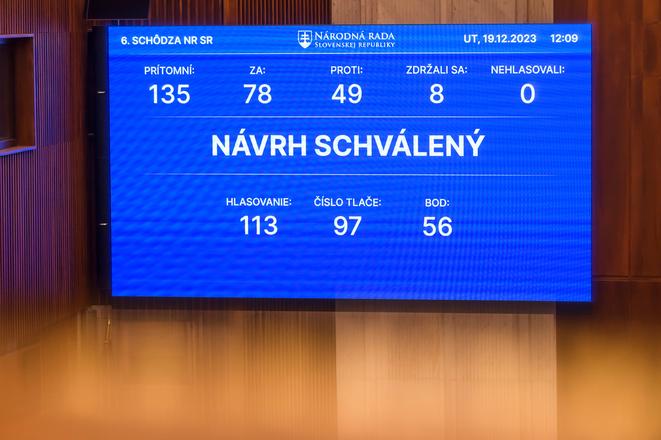Parliament, in which the ruling coalition of three parties holds a majority, approved on December 19, 2023, extra measures that are said to help consolidate public finances in 2024.
For example, one of the measures is the government’s decision to increase 900 judicial and administrative fees from April 2024.
Thanks to the consolidation package, the government is hoping to obtain more than €1.5 billion. Despite this, the National Bank of Slovakia, which is the country’s central bank, experts, and the opposition, don’t see much consolidation efforts on the part of the government.
“The government package contains measures that significantly increase public finance revenue. On the other hand, there are several expenditure measures in the 2024 budget that will worsen public finances,” the bank writes in its latest economic forecast published on December 19.
The Robert Fico IV government plans to help households with energy bills and support pensioners and mortgage debtors, but it also wants to establish a new ministry from January. Although these measures can help people, support consumer demand and support the economy in the short-term, the central bank warns that the government is slowing down the pace of public finance consolidation.
“The price to pay for this may also be higher inflation in the coming years and slower long-term economic growth,” the bank adds.
The country’s debt should increase from today’s 57 percent to over 60 percent by 2026. Despite consolidation measures, the fiscal deficit should reach 6.4 percent of GDP next year, the central bank expects. The Fitch rating agency has shared similar figures for Slovakia and downgraded the country’s rating to A- due to ‘an unclear consolidation path’.
The approved consolidation package includes the extra taxation of banks, an extended solidarity tax on excess oil profits, higher alcohol and tobacco taxes, reduced contribution to the second pension pillar, higher health contributions, as well as making Constitution Day (September 1) a work day again.
What parliament approved
The package was approved in a fast-track parliamentary procedure, with 78 of 135 MPs present in the chamber voting for the bill.
The extra 30-percent bank tax is expected to bring €336 million to the state budget in 2024. Only the banks with profits will pay the tax, which should decrease to 15 percent by 2027. Leasing firms licensed by the central bank will pay the tax, the Denník N daily writes.
The 70-percent solidarity tax, which will, for example, impact the Slovnaft refinery in Bratislava, has been prolonged by one year. The state should collect €179.8 million.
A higher VAT tax on alcohol in restaurants, rising from 10 percent to 20 percent, should increase the government’s income by €27 million. The higher alcohol tax, excluding beer and wine, should contribute to the state budget with €18 million. The tobacco tax will rise by about €0.40 a pack from February, too. This will increase income by €106 million.
A minimum corporate income tax (DPPO) will also be introduced after five years. All firms will have to pay it. The state expects to collect €102.4 million thanks to the tax. The self-employed will not pay it.
From January, health contributions for self-employed people and self-payers will increase from 14 percent to 15 percent. For employers, the contribution will increase from 10 percent to 11 percent. This increased fee will be in place until 2027.
The state will also reduce the contribution to the second pension pillar from 5.5 percent to 4 percent, which is estimated to affect people’s future pensions negatively. The government should obtain €365 million through this change. The government plans to use the sum to pay thirteenth pensions to people in 2024. At the same time, the contribution to the first pillar, administered by the state, will increase.
The withholding tax on dividends will also increase from the current 7 percent to 10 percent. The opposition pointed out that only Slovak entrepreneurs would pay higher dividends.
The taxation of individuals’ capital gains from cryptocurrencies will also be reintroduced.
The approved changes will in particular affect employers, self-employed people and firms. The tax burden on labour in Slovakia has long been the highest in the entire region.
Opposition’s efforts to stop government
The government also decided to increase 900 judicial and administrative fees from April 2024, including a passport fee and a car plate fee. Opposition MP Július Jakab (Slovensko) has launched a website called “Fico’s Fees” on which all the increased fees are listed. According to the website, a citizenship application fee will increase from €700 to €1,000 and a national visa application fee will range from €50 to €90.
The opposition, whose amendments were all rejected, said that the government is going to squeeze out all those who create values in Slovakia and accused the cabinet of indebting the country more. The government, on the other hand, blames previous governments for the state of public finances.
President Zuzana Čaputová may decide to veto the approved package, but the government holds the necessary majority to override her veto.
The debate on the measures in the chamber took several days, from last Tuesday, because the opposition has been trying to prevent the government from adopting the opposition-criticised changes to the Penal Code by the end of 2023.
Currently, the opposition is blocking the government’s efforts in a debate on the so-called Competence Act, which the government wants to pass in a fast-track procedure and without a wider debate. If amendments to the law are approved, the government would have more control over several state institutions, including the Statistics Office and the Anti-Monopoly Office.


 The government's public finance consolidation package was approved in parliament on December 19, 2023. (source: TASR)
The government's public finance consolidation package was approved in parliament on December 19, 2023. (source: TASR)